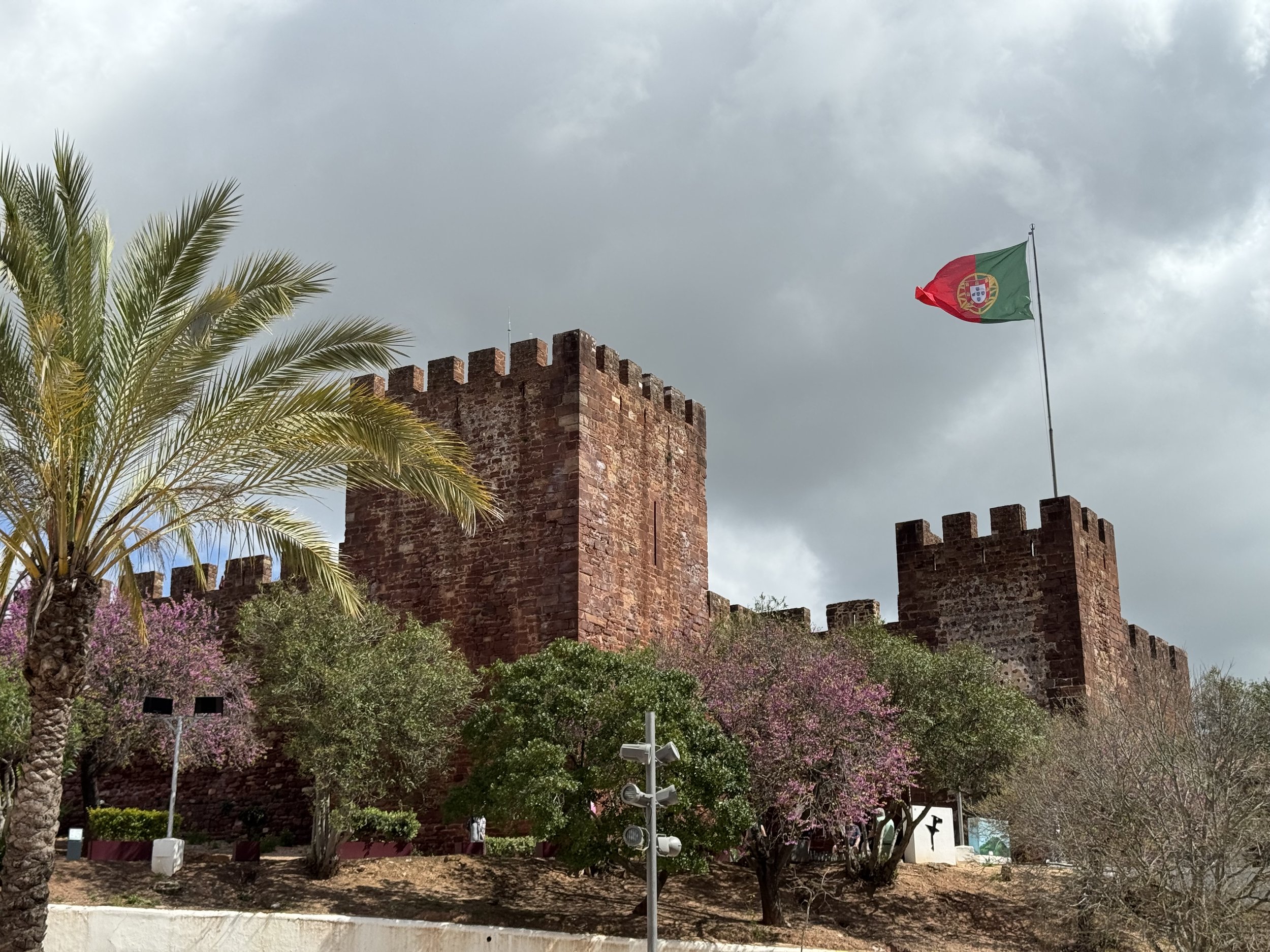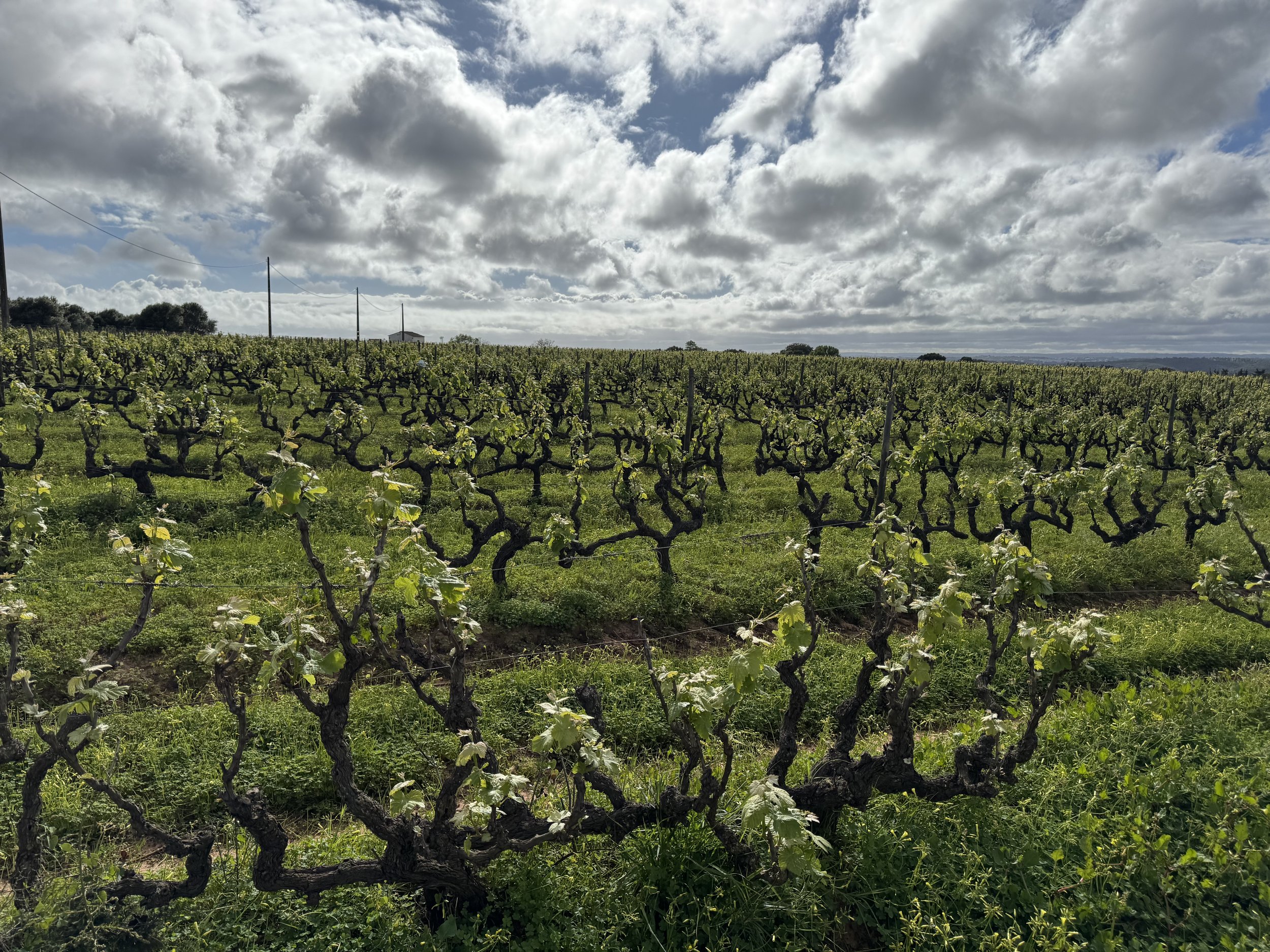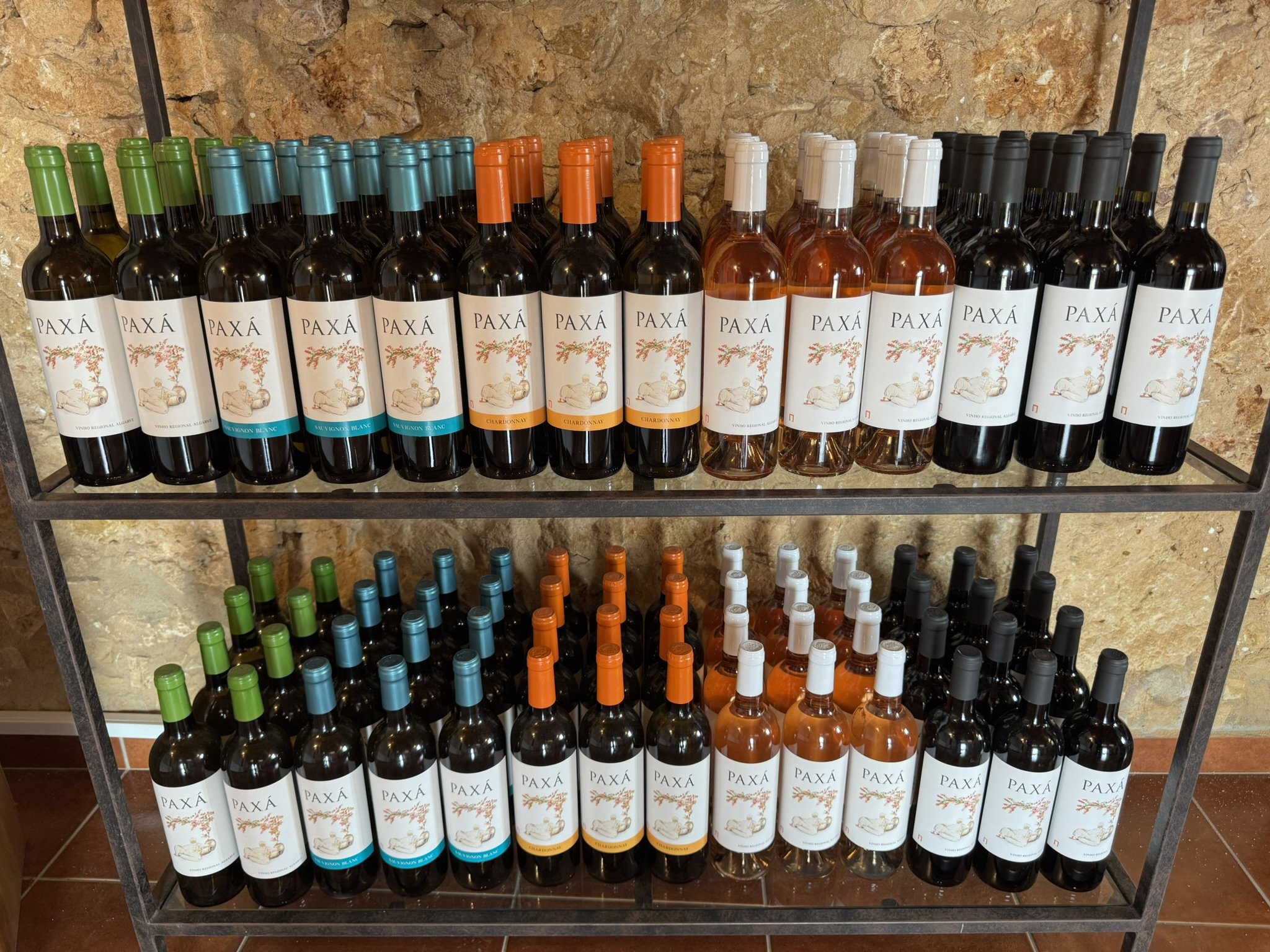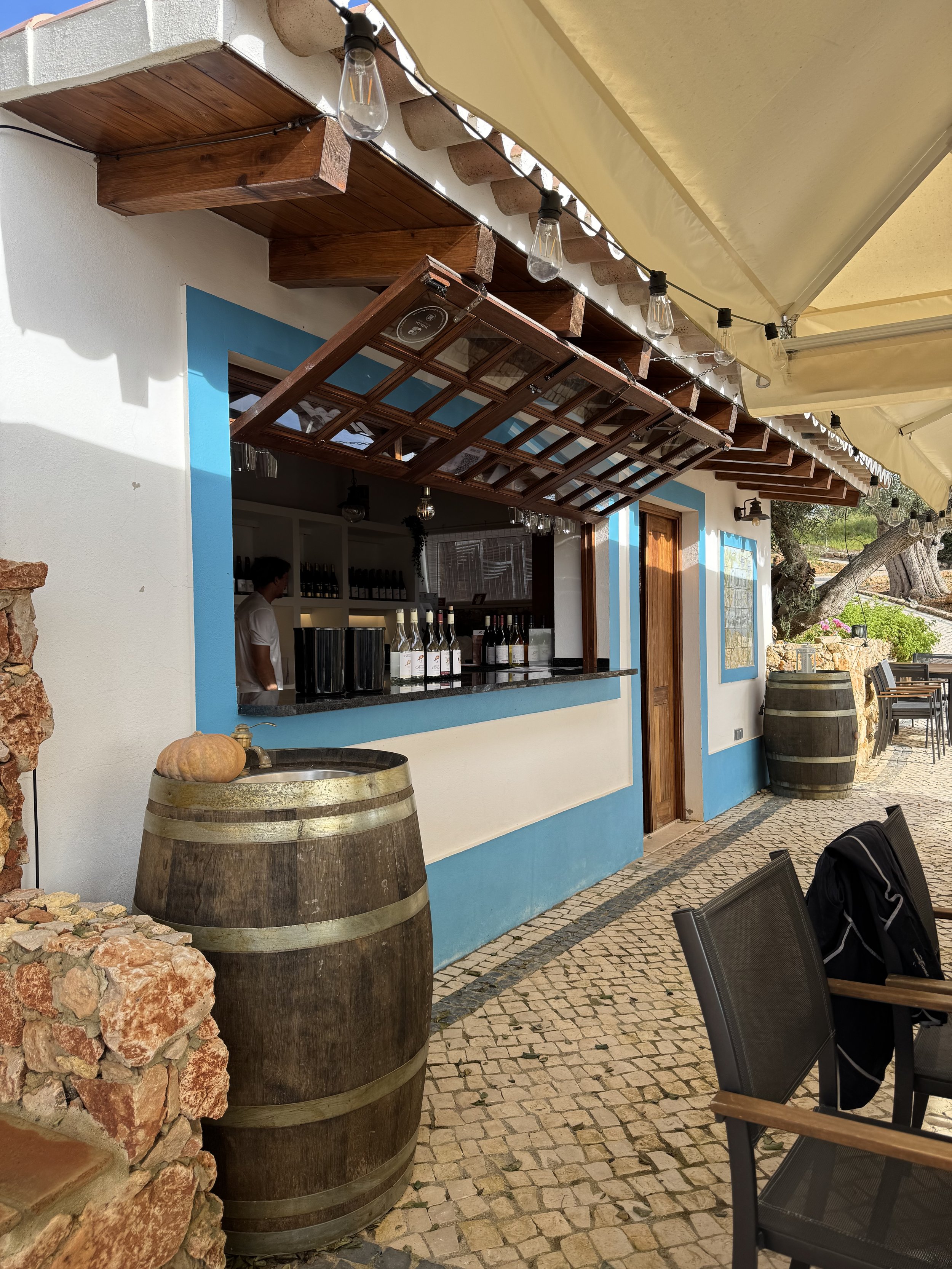Algarve Uncorked: A Connoisseur’s Guide to Portugal’s Southern Wines
While on a recent trip to Portugal for a conference and some house hunting, my wife and I ventured out to experience the history (and of course) the wines of the Algarve region of Portugal. For those unfamiliar, the Algarve is essentially the entire southern coast of Portugal, stretching from the western city of Sagres, to the Spanish border just beyond Vila Real de Santo António. Tucked into the sun-drenched southern coast of Portugal, the Algarve is known to most for its golden beaches, jagged cliffs, and slow, seaside afternoons. But beyond the postcard vistas and resort towns lies a far older story; one rooted not in tourism, but in terroir. The Algarve is home to a quiet yet deeply historic wine culture, shaped by millennia of tradition, challenge, and reinvention. While it’s not Portugal’s most famous wine region, the Algarve has an incredible history and what feels like a “new world” wine scene tucked into one of the oldest parts of the civilized world! As we look to make Portugal our future home, I wanted to shed some light on an underrated wine region and share some insight into one of my new favorite places!
History of Algarve Viticulture
The Algarve’s viticultural history begins with the Phoenicians and Greeks, seafarers who brought vines to Iberia around 2,000 B.C! However, it was the Romans who truly cultivated the region’s potential, recognizing its warm climate and diverse soils; from limestone-rich hills to deep lush valleys, as ideal for grape growing. Roman villas across the Algarve unearthed with amphorae, grape presses, and viticultural tools offer a view into to the central role wine played in daily life. By the Middle Ages, winemaking had become a key part of the Algarve’s economy, particularly under Moorish rule, when despite Islamic restrictions on alcohol, vineyards were still cultivated for trade and grape consumption. After the Christian reconquest in the 13th century, wine production flourished again under monastic stewardship and feudal systems. Portugal’s Age of Discovery in the 15th and 16th centuries brought wine from the Algarve onto maritime trade routes. Ports such as Lagos and Faro served as export hubs, and local wines accompanied Portuguese sailors across oceans. The Algarve’s proximity to these coastal cities gave it an edge, and viticulture remained a vital regional industry, bolstered by the monarchy’s interest in strengthening national wine production. However, the region’s wines never gained the same global fame as those from the Douro Valley, partly due to distance from inland trade routes and a lack of large-scale commercial investment.
Like much of Europe, the Algarve was devastated by the phylloxera plague in the late 19th century. Vineyards were destroyed, and many were never replanted. Combined with economic hardship, emigration, and a growing emphasis on tourism in the 20th century, wine took a backseat to citrus, olives, and later, real estate. For much of the 1900s, Algarve wine was seen as rustic and unrefined, produced in cooperatives, often oxidized or overly sweet, and rarely bottled for export. The region’s potential was largely overlooked, and its historic viticulture took a backseat to the booming allure of beach resorts and ex-pat tourism.
It wasn’t until the early 2000s that a quiet revival began. A new generation of winemakers, agronomists, and entrepreneurs returned to the land with fresh eyes — investing in modern techniques while rediscovering traditional varietals like Negra Mole, Castelão, and Crato Branco (Roupeiro). With improved vineyard management, controlled fermentation, and a focus on terroir expression, Algarve wines started turning heads. The region’s four DOC subregions; Lagoa, Lagos, Portimão, and Tavira, have gradually reemerged, producing structured reds, vibrant whites, and even elegant rosés with a distinct Atlantic influence. Today, boutique wineries, a few of which I was able to visit, are leading the charge. Organic practices, old school amphora aging, and low-intervention wines have attracted an international audience. Connoisseurs are now rediscovering the Algarve not just for its beautiful coastline, but for what grows not too far inland and expresses the region in much different ways.
Touring the Touriga
Unlike the sunny wine destinations of Napa Valley or the French Riviera, Algarve wineries are sometimes just a few kilometers from the Atlantic Ocean, taking in the salty breeze and constant winds, mixed with limestone soils and sun-soaked hillsides, all perfect for wine. There is also a mountain range not too far inland that creates a sort of reverse rain shadow, pushing the winds from the sea back towards the coast and providing some cool air during the summer in Portugal’s hottest region. During our weeklong excursion, we were able to visit 4 wineries that gave us a great sampling of the culture, hospitality, and tastes of the Algarve.
Quinta do Francês Winery
Tucked into the picturesque Odelouca River Valley near Silves, Portugal, Quinta do Francês is a family-owned winery that has become a notable name in the Algarve’s growing wine scene. Founded by French pathologist Dr. Patrick Agostini and his wife, the estate spans approximately 9 hectares of vineyards, reflecting the couple’s passion for viticulture and commitment to producing high-quality wines. The journey of Quinta do Francês began in 2002 when the Agostini family planted their first vines in the fertile soils of the Odelouca Valley. By 2008, their winery was fully operational, marking the realization of a lifelong dream. The estate’s name, translating to “The Frenchman’s Estate,” pays homage to Dr. Agostini’s heritage and his vision of bringing a touch of French winemaking tradition to the Algarve region. I am always excited to see winemakers from other countries bring their skills around the world and integrate their winemaking style with the local varietals. Another notable example of this is my friend Eva who is Croatian and makes wine in New Zealand. Read about her here: www.anchoredvines.com/blog/wine-spotlight-eva-pemper-2021-sauvignon-blanc.
Quinta do Francês benefits from a unique terroir characterized by a blend of clay, limestone, and sandstone soils. This diverse soil composition, combined with the Algarve’s exceptional climate, provides an ideal environment for cultivating a variety of grape species. The vineyard primarily focuses on red grape varieties, including Trincadeira, Aragonês, Cabernet Sauvignon, and Syrah, each contributing distinct characteristics to their wines. If you don’t recognize these grape names, don’t feel bad, as I didn’t either. Portugal has over 200 grape varietals, and most are only found here, so there are so many more flavors to experience!
Emphasizing a harmonious balance between traditional methods and modern techniques, Patrick is dedicated to crafting wines that authentically express the region’s terroir. His portfolio features a range of reds, whites, and rosés, each reflecting the estate’s commitment to quality and the unique flavors of the Algarve. Notably, their Sauvignon Blanc has garnered attention for its subtle grassy and tropical fruit aromas, complemented by a creamy structure and a clean, fresh finish. I could easily compare it to a coastal Alvarinho from the northwest side of Portugal!
We enjoyed a guided tours that provides insight into the winemaking process, from grape cultivation to bottling. We were able to walk the vineyard, and then explore the production areas, all with great explanations of their processes. We then had a delicious tasting of our choosing accompanied by some Charcuterie in a fun and welcoming tasting room that overlooks the estate. For more information or to book a visit, check out https://www.quintadofrances.com/.
Morgado do Quintão
Just south of Silves is the quaint, yet sophisticated winery, Morgado do Quintão. Established in the early 1800s by the Count of Silves, Francisco Manuel Pereira Caldas, this family-owned estate has been a cornerstone in preserving and revitalizing the Algarve’s viticultural traditions. In recent years, Morgado do Quintão has been at the forefront of the Algarve’s wine revival. Embracing organic and low-intervention farming practices, the estate is committed to showcasing the potential of native grape varieties, to include Negra Mole, a “pinot noir” like grape who’s name translation is “soft black” which reflects its skin.
Our tasting was outside in the middle of the estate, overlooking the vines to one side, and the beautiful resort like in-ground pool on the other. This place doesn’t just do tastings but also specializes in farm stays on the estate, farmer’s table dinners, and of course tours. Alongside some awesome couples from Great Britain (the majority of tourists in the Algarve), we tasted several wines and were surprised to learn that the average “tasting” pour in Portugal is roughly the amount of a glass of wine at dinner rather than the 1oz typically given in America. Luckily, Algarve wines are typically lower alcohol, so we were able to finish the tasting and still walk. The tasting amounts were so generous, they should rename the country POUR-tugal….. hahaha get it? Amongst the wines we tasted, these were some of my favorites:
White ’23: Crafted exclusively from the Crato Branco grape, this wine presents a pale yellow hue with aromas of pineapple and green apple. On the palate, it offers freshness with saline notes, making it an excellent companion to delicate seafood dishes or as an aperitif.
Clarete ’22: This wine is a modern homage to the traditional Clarete style, made from the Algarve’s signature Negra Mole grape. It is light yet complex, featuring elegant tannins and a profile that pairs beautifully with local fish and seafood dishes. Clarete is also the name of the winery labrador who hung out with us all afternoon.
Castelão ’20: Produced from the Castelão grape, this wine exhibits ruby red hues with aromas of ripe red fruits and violets. The palate reveals soft tannins and flavors of dark red fruits, baked plum, and subtle spice, culminating in a finish with hints of dark chocolate.
Sparkling: This sparkling wine, made from the Negra Mole variety, displays a pale yellow color with salmon nuances. Aromas of brioche and citrus lead to a fresh and salty palate, making it a perfect match for shellfish.
After the tasting we took a stroll around the grounds and learned more about the family history and future plans to bring more ancient varietals back to the region! This one is a MUST visit if you’re in the area!
For a comprehensive overview of their wine offerings or to plan a visit, you can explore their official website: https://www.morgadodoquintao.pt.
Paxá Wines
Paxá is a family-owned winery founded in 2008 by Joaquim Lopes and his son Tiago and yet another testament to the passion and potential of the Algarve wine region in Portugal. Located not far from Morgado do Quintão, Paxa Wines has become a symbol of innovation and tradition, producing exceptional wines that capture the essence of the region. The winery offers a diverse portfolio, including the Paxá Special 2019, Paxá Negra Mole 2023, Paxá Red Reserve 2022, and Paxá White Reserve Viognier. This winery is larger than most and has several tiers of their wines that can be found in far more places than the boutique wineries. For those familiar with Washington State, think of Chateau Ste Michele.
During our tasting, we were invited to choose any 3 from their “Premium” wines which is the middle tier and offered some amazing single varietals as well as blends, which Portugal is most known for. What sets Paxá apart is the balance between tradition and innovation. The vineyards are planted with a blend of native Portuguese grape varieties, like Touriga Nacional, Aragonês (Tempranillo), and Crato Branco (Roupeiro), as well as international favorites such as Syrah, Cabernet Sauvignon, and Viognier. Some wines are aged in oak to develop complexity, while others are bottled young to retain their natural freshness. Our tasting also came with a Charcuterie board with completely local goods to include Mackerel, which was the first time I had fish during a tasting flight, but it paired so nicely with the whites and was very enjoyable overall.
I really enjoyed this winery, its location, and tasting room staff. They were very knowledgeable and super friendly, even though we were walk-ins not long before their lunch hour. This location is great for larger gatherings, and they also host events in their tasting room with music and international food pairings.
Find out more by visiting: https://paxawines.pt/paxa/.
Quinta dos Capinhas
Last but certainly not least, was our favorite wine stop, just outside the tiny town of Porches (pronounced “pour-chezz”). This family-owned boutique vineyard has quickly become a beacon for wine enthusiasts seeking authentic Algarvian flavors and immersive experiences, and our time there was no different. In 2013, the Capinha family returned to their ancestral lands in Porches with a vision: to rejuvenate the vineyards that once thrived there and honor the region’s rich viticultural heritage. By 2015, they had planted new vines, leading to their inaugural wine production in 2018. The year 2022 marked a significant milestone as João Capinha took the helm, implementing sustainable agricultural practices in collaboration with esteemed Portuguese viticulturists. This commitment has positioned Quinta dos Capinhas at the forefront of Lagoa’s wine renaissance. Perched in a gorgeous valley with sweeping views of the Monchique mountains and the Atlantic Ocean, the vineyard benefits from a unique microclimate. The sandy-loam soils, combined with the moderating sea breezes and abundant Algarvian sunshine, create optimal conditions for grape cultivation.
While sharing a tasting tour with some Scandinavian new friends, we were well taken care of by our gracious hosts who laid out a perfect table of wines and snacks. Honestly, I could probably live solely on the cured Iberian ham in Portugal and every Charcuterie plate was abundant! We sampled 5 or 6 different wines, all of them large pours, and spent the afternoon overlooking one of the prettiest inland views we had all week. Some of the tasting notes on the wines we tried include:
Alicante Bouschet 2020: This robust red wine presents aromas of black fruits intertwined with hints of cocoa, tobacco, and subtle smoky notes. On the palate, it is full-bodied with ripe tannins and a prolonged finish. It pairs excellently with traditional Portuguese dishes such as stews and charcuterie.
Antão Vaz 2021: Crafted from the Antão Vaz grape, these white wines are known for their crisp acidity and vibrant fruit flavors, making them ideal companions for seafood and light poultry dishes.
Touriga Nacional 2019: A single-varietal red wine that showcases the floral and fruity characteristics of Portugal’s flagship grape, offering a well-structured palate with smooth tannins.
Rosé 2020 & 2023: These rosé wines are characterized by their fresh and aromatic profiles, making them perfect for warm climates and pairing with light salads or as an aperitif. Both were quite different, one more complex and built for food, while the other was a typical light and refreshing porch pounder.
Chardonnay Reserva 2023: This reserve Chardonnay offers a complex profile with balanced acidity and notes of tropical fruits, suitable for pairing with creamy pasta dishes or grilled fish.
While the estate is already beautiful and inviting for guests, they are also building a restaurant on the property to accompany the guest houses and large event spaces! This was hands down the most picturesque winery we toured and somewhere I could see myself spending a lot more time should we live in the area.
For a comprehensive overview of their wine offerings or to plan a visit, you can explore their official website: https://quintadoscapinhas.com/
Closing Notes
As Portugal’s sun-soaked south continues to attract travelers with its beaches and charm, its wines are quietly becoming one of the region’s best-kept secrets. From ancient grape varieties and passionate winemakers to modern cellars tucked between olive groves and ocean views, the Algarve offers a wine experience that’s as authentic as it is unforgettable. Whether you’re tasting a crisp Crato Branco by the sea or savoring a bold Alicante Bouschet under vineyard skies, Algarve wines bring something special to the table — a sense of place, history, and heart. So next time you find yourself in this beautiful corner of Portugal, follow the vines inland!





